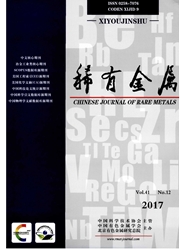

 中文摘要:
中文摘要:
通过热力学分析计算,给出了镍钼矿直接热还原的ΔG^Θ-T图,用于直观分析不同温度下镍钼矿中矿物的还原过程,并在此基础上进行低品位镍钼矿加钙焙烧及硅铁直接热还原实验。研究表明:镍钼矿原有工艺的焙烧温度为580-620℃,反应速率低,焙烧时间长,升温会增加钼的挥发,加钙氧化焙烧可以将焙烧温度提高到700℃,提高了反应速率,并且可以将钼固定在矿物中,生成稳定的钼酸钙,减少氧化钼的挥发,起到良好的固钼作用。对镍钼矿氧化焙烧、硅铁直接还原过程进行分析,绘制镍钼矿中硅铁还原在不同温度下各反应的热力学状态图。分析研究表明,低温下的固-固反应中,硅铁均可还原氧化钼,但铁对氧化钼的还原能力较弱,Fe不能还原Ca Mo O4;液-固反应中,硅可还原氧化钼、钼酸钙,但铁没有还原能力;在铁浴反应阶段及钢渣界面的反应,起还原作用的主要是硅。实验室中加钙焙烧-硅铁直接热还原工艺制备镍钼铁合金,镍、钼的收得率均在85%以上,焙烧过程中硫被Ca O固定在熔渣中,有利于环保。
 英文摘要:
英文摘要:
According to the results of thermodynamic analysis and calculation,ΔG^Θ-T diagrams of the direct thermal reduction of NiMo ores were drawn to visually analyze the reduction process of Ni-Mo ores at different temperatures. Moreover,experiments on the roasting with calcium and direct thermal reduction of low-grade Ni-Mo ores were carried out. The results showed that the original roasting temperature of Ni-Mo ores ranged from 580 to 620 ℃,therefore,the reaction rate was slow and the roasting time must be prolonged. Raising the roasting temperature would inevitably increase the volatilization loss of molybdenum. However,when the Ni-Mo ores were roasted with calcium,the roasting temperature could be raised to 700 ℃,at the same time,the reaction rate increased and the volatilization loss of molybdenum reduced because of the formation of Ca Mo O4,which played an effective role in stabilizing molybdenum in the ores. The process of Ni-Mo ores roasted with calcium and direct thermal reduction with ferrosilicon was studied. Thermodynamic state diagrams of these processes were predicted. The results indicated that both Si and Fe could deoxygenize molybdenum,but the deoxidization ability of Fe was weak and could not deoxygenize Ca Mo O4 during solid-solid state reactions at low temperatures.During the stage of liquid-solid state reaction,Si could deoxygenize the molybdenum and Ca Mo O4,whereas Fe had no capability for the reduction of molybdenum and Ca Mo O4. Furthermore,Si played a primary role in deoxygenizing reaction of steel-slag interface and iron bath. In laboratory,Ni-Mo-Fe alloy were successfully prepared from Ni-Mo ores through roasting with calcium and direct thermal reduction with ferrosilicon. The yield rates of both Ni and Mo exceeded 85%. Sulfur was fixed by Ca O in the slag during the roasting process,which was conducive to environment protection.
 同期刊论文项目
同期刊论文项目
 同项目期刊论文
同项目期刊论文
 Effect of Boron mud and CaF2 on the surface tension and density of CaO-SiO2-B2O3 ternary Slag System
Effect of Boron mud and CaF2 on the surface tension and density of CaO-SiO2-B2O3 ternary Slag System Experiment on direct smelting and alloying process between high-carbon ferrochrome and molybdenum ox
Experiment on direct smelting and alloying process between high-carbon ferrochrome and molybdenum ox Microstructure and performance of solid TC4 titanium alloy subjected to the high pulsed magnetic fie
Microstructure and performance of solid TC4 titanium alloy subjected to the high pulsed magnetic fie Microstructure and mechanical properties of AZ91 magnesium alloy subject to deep cryogenic treatment
Microstructure and mechanical properties of AZ91 magnesium alloy subject to deep cryogenic treatment Thermodynamic Model of Calculation of Sulfur Distribution Ratio between B2O3-Containing Slag and Mol
Thermodynamic Model of Calculation of Sulfur Distribution Ratio between B2O3-Containing Slag and Mol 期刊信息
期刊信息
